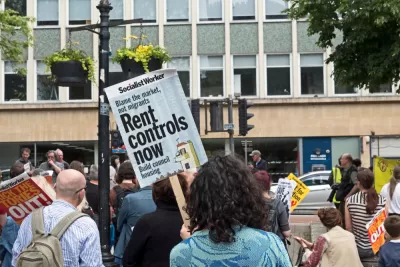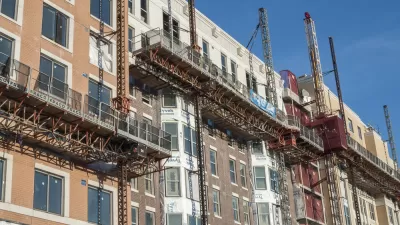A potential precedent setting case against rent control is underway in New York. A Next City article takes an in-depth look at the legal argument made by landlords against the state of New York's new rent control law.

Jared Brey interrogates the legal case presented by landlords in New York in a lawsuit designed to overturn the state's new rent control law.
Here's the gist of the legal argument made by the plaintiffs:
In July, a group of landlords and landlord associations filed the suit [pdf], naming the City of New York and the Rent Guidelines Board as defendants. It’s a long complaint, well over 100 pages, and it attacks the rent stabilization laws from a number of angles. The arguments are aimed at the rent stabilization program as a whole, rather than just the expansions that were recently approved by the legislature. The laws violate due process, they argue. And, they say, by so severely restricting their use of the apartments, the laws amount to a “taking” of landlords’ property under the 5th Amendment.
Furthermore:
The takings argument turns on two concepts. One is that the laws are so onerous that they amount to a “physical taking” of private property by the government — like eminent domain but without any compensation. The other is that they add up to an “uncompensated regulatory taking,” because restricting the amount of rent that landlords can charge lowers the value of the property.
Brey speaks to trio of legal experts for insight about the potential for those arguments to prevail in court, encountering mostly skepticism. There is some agreement, however, that expanded rent control could lower the resale value of multi-family buildings.
FULL STORY: Is Rent Control a ‘Taking’ of Landlords’ Property?

Planetizen Federal Action Tracker
A weekly monitor of how Trump’s orders and actions are impacting planners and planning in America.

Restaurant Patios Were a Pandemic Win — Why Were They so Hard to Keep?
Social distancing requirements and changes in travel patterns prompted cities to pilot new uses for street and sidewalk space. Then it got complicated.

Map: Where Senate Republicans Want to Sell Your Public Lands
For public land advocates, the Senate Republicans’ proposal to sell millions of acres of public land in the West is “the biggest fight of their careers.”

Maui's Vacation Rental Debate Turns Ugly
Verbal attacks, misinformation campaigns and fistfights plague a high-stakes debate to convert thousands of vacation rentals into long-term housing.

San Francisco Suspends Traffic Calming Amidst Record Deaths
Citing “a challenging fiscal landscape,” the city will cease the program on the heels of 42 traffic deaths, including 24 pedestrians.

California Homeless Arrests, Citations Spike After Ruling
An investigation reveals that anti-homeless actions increased up to 500% after Grants Pass v. Johnson — even in cities claiming no policy change.
Urban Design for Planners 1: Software Tools
This six-course series explores essential urban design concepts using open source software and equips planners with the tools they need to participate fully in the urban design process.
Planning for Universal Design
Learn the tools for implementing Universal Design in planning regulations.
Heyer Gruel & Associates PA
JM Goldson LLC
Custer County Colorado
City of Camden Redevelopment Agency
City of Astoria
Transportation Research & Education Center (TREC) at Portland State University
Camden Redevelopment Agency
City of Claremont
Municipality of Princeton (NJ)





























